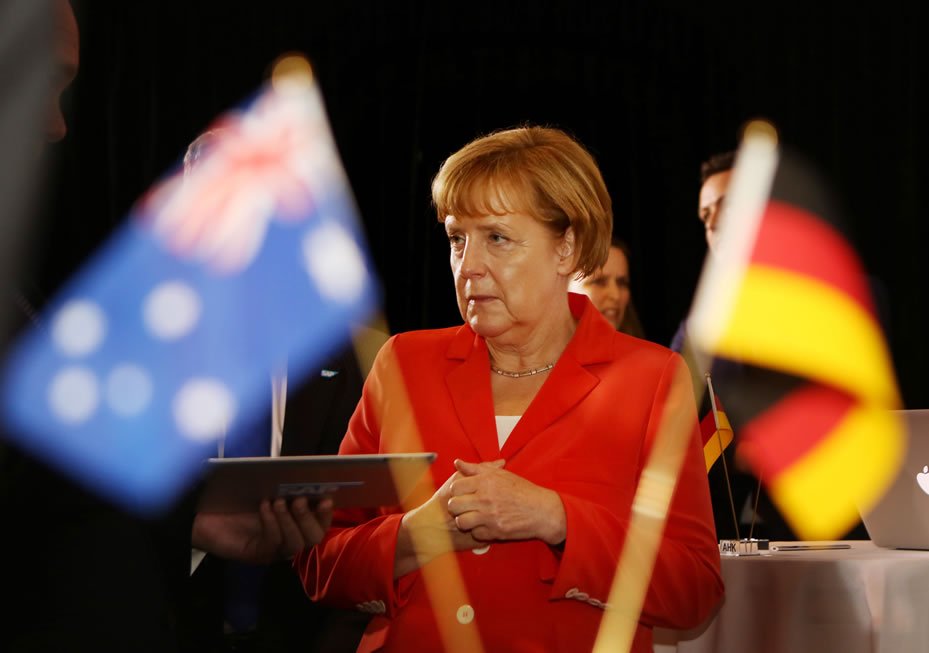German Chancellor Angela Merkel’s visit next week to Australia’s flagship information technology research agency – NICTA – must surely be causing some discomfort and embarrassment among the senior ranks of the Abbott Government.
Dr Merkel ranks as the world’s most powerful woman, steering Europe’s powerhouse economy and its research and innovation engine room.
German competitive advantage is built on this research excellence, and on its ability to quickly integrate the fruits of these efforts into efficient commercial enterprise.

The Germans are great at this stuff, and in recent times has sought to internationalise its recent efforts and intensify collaboration.
Angela Merkel has been a huge on-going influence in this sector in Europe. It is a lifetime passion for her. She is a physicist by training and, in her pre-political life, was a research scientist by profession.
She sees investment in STEM (science, technology, engineering and maths) education as a fundamental pillar of a successful German economy, as well as to its broader civil society.
As Chancellor, Dr Merkel’s takes every opportunity to promote science research, and the application of technology more generally.
So when she turns up at the NICTA laboratory in Sydney next Monday, she brings with her all the weight and profile of the Chancellors office to bear on the scientific work being done in Australia.
It is an amazing coup for NICTA, and an incredible opportunity. The visit NICTA seems to have come out of the blue, with its confirmation just days before the Chancellor’s arrival, although in reality the German-Australian Chamber of Commerce has been pressing for this for some time.
Which brings us to the Australian Government’s supposed discomfort and embarrassment. The Chancellor’s NICTA visit does put them in a bit of a pickle.
For a start, has anyone told Dr Merkel that the Australian Government has cut NICTA adrift?
That it will receive no direct funding from Canberra after June 2016? That NICTA is, quite literally, fighting for its survival and may cease to exist in the near future?
That would be an awkward conversation to have with Dr Merkel as she tours through the Future Logistics Living Lab, a collaboration between NICTA and Germany’s famed Fraunhofer research organisation.
Of all the R&D collaborations between Australian and Germany (and according to the Department of Foreign Affairs there are more than 300, making Germany our third most important research partner), the Fraunhofer is the highest profile, and arguably the most prestigious.
But for the senior Minister who will tour the Fraunhofer collaboration with the Chancellor, meeting with the seconded German researchers and their NICTA partners, there is an even more uncomfortable scenario.
It is, of course, very likely that the Chancellor’s office already knows about the NICTA funding cuts, and that Dr Merkel’s is coming to visit anyway. Perhaps she is deeply unimpressed, particularly given the Fraunhofer’s (and German’s generally) very long-term investment view of research relationships.
Fraunhofer does not enter these research collaborations easily or lightly, and when they do, they commit for the long term. This is the German way.
Make no mistake, this is an embarrassment for the government. NICTA’s unresolved funding issues are simply an embarrassment.
Dr Merkel’s visit is the first by a German Chancellor in 25-odd years. Outside of the official G20 functions, she has extremely limited time on the ground in Australia and less than a day in Sydney. And she will spend a chunk of it at a globally respected research institute that may no longer exist as an independent entity in 12 months time.
The Chancellor will certainly be welcomed by the scientists at NICTA. No doubt it will make a pleasant change to speak to a politician who has a doctorate in physics, rather than usual non-technical types produced in this country.
Immediately following her NICTA tour, Dr Merkel will deliver the Lowy Institute’s 2014 address. Hopefully she will includes some thoughts on the globalisation of research, and creation of global supply chains in science and innovation.
The G20 is such an extraordinary event. So many global leaders, and so little time to properly engage them all.
As a side note to all of this, the Prime Minister’s Office has asked that Industry Minister Ian Macfarlane to deputise for Tony Abbott as the official Australian Government host at the NICTA, which seems extraordinary.
The Queensland cattle farmer known as “Chainsaw” is a likeable and impressive industry minister. But is he really the best person to host an East German physicist on a tour of a logistics research facility? Really?
Mr Macfarlane shares ministerial responsibility for NICTA with Malcolm Turnbull (and with Education Minister Chris Pyne.) But it is Mr Turnbull who has been the public face of NICTA policy. And Mr Macfarlane has said openly and publicly that he is happy to let Mr Turnbull have the running on NICTA issues.
It is understood that Malcolm Turnbull will also attend, having been forced to push his way into the schedule. It must be a source huge frustration that the Prime Minister’s Office keeps him boxed on the sidelines so thoroughly.
Do you know more? Contact James Riley via Email.

